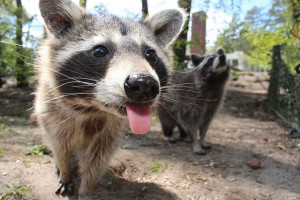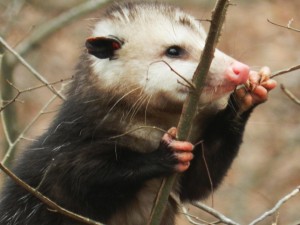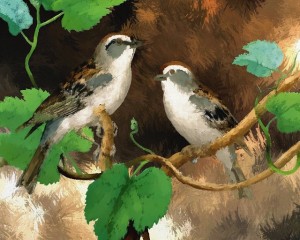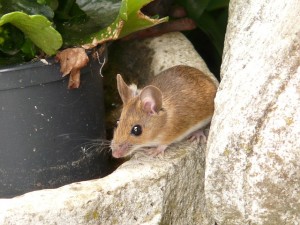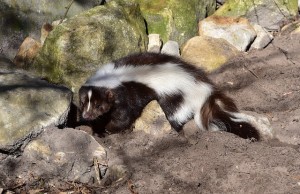Summertime in the Chicagoland area usually means warm weather and longer days. It also means animals are out moving about and mothers are teaching their young how to forage. This time of the year you need to keep a lookout for animals who just might be trying to take up residence in your home. And they do not plan on paying rent!
Category Archives: Skunks
Skunks’ Winter Habits
Many people are under the impression that skunks hibernate during the winter. While skunks do typically go dormant for a month or so during the winter season, they do not truly hibernate.
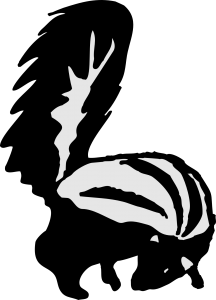 True hibernators have a considerably lower heart rate, have almost no respiration and only take a couple of breaths per minute. Skunks do not have these drastic drops in heart rate or respiration. Skunks do prepare for winter in similar ways as hibernating animals though. They eat large amounts so that during the long naps they do take they can survive on their fat stores.
True hibernators have a considerably lower heart rate, have almost no respiration and only take a couple of breaths per minute. Skunks do not have these drastic drops in heart rate or respiration. Skunks do prepare for winter in similar ways as hibernating animals though. They eat large amounts so that during the long naps they do take they can survive on their fat stores.
During their long winter naps, skunks can sense a rise a temperature. This easily wakes them and they usually immediately search for food. Males are typically more active than females, so if you happen to come across a skunk during the winter months, it is likely a male.
Where do Skunks Live in the Winter?
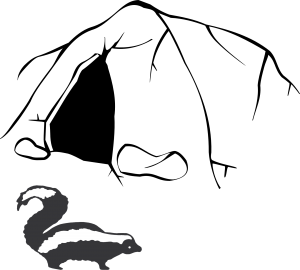 During the winter, skunks usually live in a burrowed den underground. They usually line their dens with grass, leaves, and other foliage in order to keep warm and they have several entrances/exits to quickly escape danger. Skunks have been known to move in to an open shed or garage as well. Skunks are excellent diggers and seek the easiest point of entry. If you’re concerned about skunks moving in during the winter, keep an eye out for any holes, typically 3-4 inches, in your garden, yard, and around your home exterior. Skunks may also move in under your deck or porch and build a den there to avoid the elements. If you smell a musky odor and hear noises at night, you might have a skunk.
During the winter, skunks usually live in a burrowed den underground. They usually line their dens with grass, leaves, and other foliage in order to keep warm and they have several entrances/exits to quickly escape danger. Skunks have been known to move in to an open shed or garage as well. Skunks are excellent diggers and seek the easiest point of entry. If you’re concerned about skunks moving in during the winter, keep an eye out for any holes, typically 3-4 inches, in your garden, yard, and around your home exterior. Skunks may also move in under your deck or porch and build a den there to avoid the elements. If you smell a musky odor and hear noises at night, you might have a skunk.
Skunks can do damage to your property if they decide to seek refuge there during the winter. Their burrowing for a den and digging for food are usually the most common nuisance. Your yard and garden may be damaged by a skunk searching for food or burrowing. Attic Solutions specializes in locating and sealing burrows, trapping and removing skunks, and fixing damage to your home.
As soon as you suspect you may have a skunk infestation, contact us online or call us immediately at 847-464-1861 for removal. We are trained professionals and equipped to deal with wild animals.
Increased Skunk Activity Chicago
There has been a marked increase of skunk activity in the local area recently. Skunks may not look very menacing, but they can do a lot of damage to homes and property as well as our health. This can be a concern for homeowners because skunks typically go dormant for a month in winter and they be looking for a warm place to nest.
How Do You Know If A Skunk Moved In?
You will probably smell a skunk before you see one. Some clues a skunk has decided to move in on your property include that strong, musky odor in areas such as under the deck or porch, or near woodpiles. Skunks are not unknown to take up residence in an open garage or shed as well. Skunks dig and burrow, so be aware of any holes, typically 3-4 inches, in your yard, garden, and around your home exterior. Skunks are nocturnal animals, so if you hear noise at night under your porch, deck, or other buildings, this may also be a good indication they moved in.
Can Skunks Do Damage To My Property?
Yes! Unfortunately, skunks can be quite a nuisance. Your yard and garden may be damaged by a skunk searching for food or burrowing. Skunks often seek shelter under porches, decks, and crawlspaces. These animals are adept diggers and look for the easiest point of entry, including a hole or crack in your foundation, which can undermine it. Once they find a comfortable spot, especially as it gets colder out, they may make a den. Attic Solutions specializes in locating and sealing burrows, trapping and removing skunks, and fixing damage to your home.
Can Skunks Do Damage To My Health?
While a skunk’s biggest threat is its smell, they are primary carriers of rabies (along with bats, foxes, and raccoons). Skunks may also carry distemper, which can be lethal to dogs and cats. If you encounter a skunk, move away slowly to avoid a smelly confrontation!
As soon as you suspect you may have a skunk infestation, call us immediately at 847-464-1861 for removal. We are trained professionals and equipped to deal with skunk exclusion and removal, including humane live animal trapping (never poisons!). Learn more about our skunk removal services or fill out our contact form.
Keep Summer Animals Out of Your Home
Keep Summer Animals Out of Your Home
The summer is at its halfway point and if you have been successful in keeping pests and intrusive animals out of your house, then you have won half the battle. In the remaining days of the summer, homes are still at high risk for animal intrusions so homeowners should continue to be aware of the potential entry points and common hiding spots for animals in their homes. There are a variety of different animals in the Chicago area that seek shelter indoors and the following tips will help you prevent animal intrusions and take the right actions should one occur.
Identify What Animal Has Invaded Your Home
There are always a variety of animals looking for indoor shelter and animals such as birds, bats, and snakes are most likely to invade homes in the late summer. Many birds are laying eggs in the mid to late summer which means that they are also looking to build nests. Intrusive birds commonly nest in attics and crawlspaces so make sure to check these areas regularly for any nests. Bats and snakes may also invade these areas during the summer as they enjoy the heat and the shelter.
Find Exit/Entry Point
If you believe an animal may be going in and out of your attic or crawlspace, place a piece of cardboard over each possible entry point. The cardboard will have chew and claw marks if there is an animal coming and going but this discovery could also mean that you have trapped the animal inside. If you are positive that the animal is indeed trapped in your home, it is time to take actions to get rid of it.
Removing Animals from Your Home
The first thing you should do once you confirm that an animal is in your house is shut your interior doors to quarantine the animal in one room. Once this is done, try opening a window or door to the outside and turn off the lights so that the only light in the room is coming from the opening. Many times the animal will find their own way out in this scenario. If the animal has made itself comfortable in your home by building a nest or lodging itself into a small space such as the dryer vent, then it is best to contact a wildlife professional to trap and remove it.
As the second half of the summer season starts to wind down, make sure to stay alert and watch out for animal intrusions around your home. There are several types of animals such as birds and bats that commonly invade homes in the late summer and taking these actions can help you prevent or eliminate late summer intruders. If an animal infestation is too much for you to handle on your own, contact Attic Solutions for our live trapping and animal removal services.
As soon as you suspect you may have a animal infestation, call us immediately at 847-464-1861 for removal. We are trained professionals and equipped to deal with animal exclusion and removal, including humane live animal trapping (never poisons!). We will remove the animal and fix any property damage they may have caused. Click to read more about animal removal services from Attic Solutions.
How to Get Rid of Skunk Smell
For the most part, skunks are not a nuisance as they mostly keep to themselves but they are always a threat to spray a person or pet if they feel threatened. Pets are especially prone to getting “skunked” because other animals peak their curiosity and they are unaware of the possibility of getting sprayed. This spray has a pungent, unpleasant sulfur-like odor that will cling to your clothing, hair, and skin and it can be difficult to get rid of. The following is a recipe for a solution that can effectively clean the spray from you, your pet, or your clothes and remove the odor.
Myth: Tomato juice will remove skunk smell
Many people believe that bathing in tomato juice will eliminate the smell of the skunk spray but it is ineffective because it cannot break down the oils from the spray. Other remedies such as citrus juice, perfume, and air fresheners are also ineffective for getting rid of the skunk smell.
Get Rid of Skunk Smell Recipe
To create an effective solution for skunk spray, mix:
- 1 quart of 3 percent hydrogen peroxide
- ¼ cup of baking soda
- 1 to 2 teaspoons of dishwashing liquid into a bucket
*Make sure this solution is mixed well before using it
How To Use The solution
This solution can be used on your body, hair, and clothes as well as your pets to eliminate the skunk odor. If your body or hair has been sprayed, give yourself a bath in the solution and rinse in the shower. You can wash your hair in the solution as well but be careful to avoid getting it in your eyes. If the skunk spray got in your eyes, immediately flush your eyes out with water. This process may have to be repeated several times to fully eliminate the skunk smell.
Skunk Removal From Clothes
If your clothes have been sprayed and have the skunk smell, they can be washed using this solution. Make sure to wear rubber gloves when washing your clothes and scrub them in a bucket but be aware that the solution can slightly bleach the fabric. This solution can also be used to remove the smell from your pet. It is best to wash your pet outside and be careful not to get the solution in its eyes as you wash. Work the solution into each section of your pet’s fur and let it soak in for several minutes. After letting the solution soak, rinse your pet with a hose and repeat the process if the smell is still lingering.
Additional Important Notes:
Make sure to keep this solution out of yours and your pet’s eyes and because this is an unstable solution, it should never be stored and must be diluted with water before getting poured down the drain.
As soon as you suspect you may have a skunk infestation, call us immediately at 847-464-1861 for removal. We are trained professionals and equipped to deal with skunk exclusion and removal, including humane live animal trapping (never poisons!). Click to read more about skunk removal services from Attic Solutions.
Identification of Rabies and How to Protect Yourself and Your Pets
Wild animals can be troublesome to homeowners in a variety of ways from destroying property to contaminating food supplies but the health risks they pose are the biggest cause for alarm. The most common disease that homeowners fear from wild mammals is rabies. Rabies is a severe, infectious disease that attacks the central nervous system in mammals. It is possible for humans to become infected with rabies if they are bitten by an infected animal. Recognizing the symptoms in wild animals can help you avoid infected animals and keep your pets safe as well.
Rabies Identification
The vast majority of rabies cases in North America are attributed to wild mammals with the most common carriers including raccoons, skunks, bats, foxes, and coyotes. Most animals that are infected with rabies exhibit peculiar behavior that is characteristic of the disease. Animals with rabies are easily agitated, salivate profusely, and snap or bite at nothing and they may also seem partially paralyzed or disoriented when they move. It is possible that these symptoms could be caused by another disease such as distemper, but it is still recommended to avoid any animal exhibiting this odd behavior.
How Rabies is Spread
While rabies can spread to humans, it is quite rare as there are only 28 reported fatal cases of rabies in the United States within the last 10 years. It is spread exclusively through saliva as opposed to blood, urine, or feces because the virus can only survive in saliva. In order for humans to become infected, they must be bitten by an infected animal and the bite has to break skin. The rabies virus cannot infect someone through unbroken skin. If you are bitten by a wild mammal that could have rabies and the bite has broken the skin, you should seek medical treatment immediately.
How to protect yourself from rabies
The best way to protect yourself and your pets from rabies is to avoid wild animals that may be rabid and get your pets vaccinated for the disease. If you or your pet is bitten by a wild animal, immediately flush the wound with water and use antiseptic soap to clean the area. After cleaning the wound, you should seek treatment as soon as possible from a doctor or veterinarian if your animal was bitten. In some cases of rabies, humans unknowingly contracted the disease by being bitten by a bat. If you discover that you may have come into contact with a bat, it is safer to assume that you have been bitten and act accordingly. It is important to seek medical treatment immediately after being bitten by a potentially infected animal because rabies will become fatal in people and pets if it is not treated right away.
If you suspect you may have a animal infestation, call us immediately at 847-464-1861 for removal. We are trained professionals and equipped to deal with animal exclusion and removal, including humane live animal trapping (never poisons!). We will remove the animal and fix any property damage they may have caused. Click to read more about animal removal services from Attic Solutions.
Inspecting Your Home for Animals this Spring
The winter weather has finally left the Chicago area and the spring season is the ideal time for homeowners to do a thorough inspection of their homes for animals or signs of an intrusion. This winter was extremely cold with record snowfall so it is possible that a squirrel, raccoon, or other animal may have found shelter in your home to escape the conditions. By thoroughly inspecting your home inside and out, you can locate potential entry points and discover areas where animals may have been.
Inspect from the top down
The best way to inspect your home for animal intruders is to start in the attic and work down towards the basement. When performing this inspection, make sure to take your safety into account as intruding animals may bite and scratch which could spread infection or disease. It is recommended to wear protective clothing, work gloves, and steel toe boots and it may be wise to consider wearing a respirator mask and safety glasses as well. Make sure to carry a bat or something to defend yourself with in case an animal is still hidden in your home and attacks you.
Areas in your home to keep an eye out for
As you work your way through the house, inspect the floors, walls, and ceilings for small openings that may allow animals to enter from the outside. These openings should be sealed to help prevent animals from entering in the future. When you reach the basement, use plenty of light during the inspection because working in the dark may startle groups of squirrels or skunks and create a difficult situation.
Finish with an exterior inspection
Your home inspection should end with a thorough inspection of the exterior of the house to locate and repair possible entry points. Make sure to carefully inspect the gutters, roof, foundation, and siding for any openings as well as vents, air ducts, and windows. As you discover potential entry points, look for any signs to suggest that an animal has been there.
This past winter had some of the harshest weather conditions the Chicago area has seen which makes it important to inspect your home for animals that may have intruded to escape the winter weather. Follow these tips as you work your way through your home and if you do not feel comfortable searching through certain areas of the house, contact an animal control professional such as Attic Solutions for assistance. It is best to locate and remove any intruding animals now before they start breeding.
As soon as you suspect you may have a animal infestation, call us immediately at 847-464-1861 for removal. We are trained professionals and equipped to deal with animal exclusion and removal, including humane live animal trapping (never poisons!). We will remove the animal and fix any property damage they may have caused. Click to read more about animal removal services from Attic Solutions.
Nesting Season for Wildlife
It has been a long winter in the Chicago area but the spring is finally here and the wildlife that inhabits the area will become more active as the temperature starts to rise. The majority of the wildlife in the Chicago area has been dormant throughout the winter and by the spring; they are looking to build nests which may cause some of them to invade your home or yard, digging up your lawn or destroying your property in the process. However, there are some preventative actions you can take to prevent animals such as rodents, birds, and others from nesting on your property. If you discover an infestation that has already taken place in your yard or home, contact Attic Solutions to have the animal removed.
Spring Animal Nesting
The main priority of most animals after they become active in the spring is to build a nest for themselves and their offspring. There are several locations in which animals may nest such as trees and shrubs as well as places where they become a nuisance such as chimneys, attics, or basements. These animals may also cause problems as they collect materials to build their nests by digging up plants in the yard or destroying insulation and drywall if they are nesting within your home. While it is natural and unavoidable for wildlife to nest in the spring season, taking certain preventative actions can reduce the possibility of an animal nesting in your home or property.
Nesting Prevention
Taking the right preventative actions is crucial when dealing with wildlife because it could save you from the property damage and headaches that an animal infestation causes. One such preventative action that will help keep animals out of your home is trimming your shrubs, bushes, and trees so that they are away from your house. Certain animals such as squirrels and birds may build their nests in trees and bushes and if the branches are close to or touching the house, it will be much easier for an animal to enter your home. Another important preventative action to take is to inspect your home for possible entry points and fixing them so that animals do not have a way in. This includes checking for torn screens, cracks, holes, or any other spaces that could act as potential entry points. It is also beneficial to keep attics, garages, and basements free of clutter so that animals do not have extra places to hide.
As the wildlife activity increases in these first few weeks of spring, take some time to inspect your yard and your home and take these preventative actions if necessary to make sure that animals stay out of your home. Most animals will be nesting in the coming weeks and even if you take the necessary preventative actions it is still possible for an infestation to occur in your home or lawn. By following these preventative actions and keeping a constant watch for potential intruders, you can avoid animal intrusions this spring.
As soon as you suspect you may have a animal infestation, call us immediately at 847-464-1861 for removal. We are trained professionals and equipped to deal with animal exclusion and removal, including humane live animal trapping (never poisons!). We will remove the animal and fix any property damage they may have caused. Click to read more about animal removal services from Attic Solutions.
Spring is the Mating Season for Skunks
The spring season is the beginning of new life and the mating season for many animals around the Chicago area including the skunk. As the weather starts to warm up, skunks increase their activity and begin their mating rituals in which female skunks will spray rejected male skunks and put their smell into the air. Homeowners should keep an eye out for skunks around their property because they can become a nuisance by burrowing in the yard, secreting their odors, and spreading diseases such as rabies through their bite. If a skunk has become a problem around your home, it is best to call an animal control professional to remove it.
Types of Skunks
There are four species of skunk that are found in the United States; the striped skunk, the spotted skunk, the hog-nosed skunk, and the hooded skunk. The striped skunk is the most common type found in the Chicago area as the spotted skunk is rare in some areas and the hooded and hog-nosed skunks are mostly found in the southwestern regions of the U.S. Each skunk type has stocky legs and large feet with claws that are excellent for digging.
Skunk Breeding Habits
Skunks are nocturnal creatures that tend to stay within a half a mile to a 2 mile diameter around their home area but males may wander about 4 or 5 miles during mating season. The breeding season for adult skunks begins in late February and litters are typically born in early May from older female skunks and in early June from younger female skunks. Skunks normally have one litter per year of 4 to 6 young but a skunk litter can contain anywhere from 2 to 16 young.
Damage from Skunks
Skunks can be a nuisance to homeowners with their burrowing, odor secretions, and their potential to spread diseases. The burrowing causes the most problems as skunks may dig under porches, sheds, and decks and may even enter buildings through the foundation. They also dig up lawns in search of grubs and have been known to dig through unsecured garbage. Their secretions are another potential nuisance as skunks are very defensive and may spray when they feel threatened by people or pets. If a skunk bites a human or another animal, they could spread diseases such as rabies and Leptospirosis among others.
As soon as you suspect you may have a skunk infestation, call us immediately at 847-464-1861 for removal. We are trained professionals and equipped to deal with skunk exclusion and removal, including humane live animal trapping (never poisons!). We will remove the skunks and fix any property damage they may have caused. Click to read more about skunk removal services from Attic Solutions.




